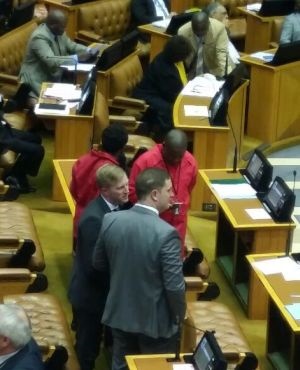
Three candidates for inspector-general of intelligence who work as senior staff in the office were grilled by Parliament’s Joint Standing Committee on Intelligence this week over how they have managed to keep the office running without an inspector-general in place.
Parliament interviewed 10 candidates for the statutory position – it is provided for in the Constitution and in terms of the Intelligence Services Oversight Act, and is responsible for monitoring intelligence services and is a watchdog that investigates complaints against the spooks.
The office has been without an accounting officer since March 2015, when Faith Radebe retired – leaving no one to legally sign off on investigations or release documents to the public.
Two of the candidates – Jayashree Govender and Mampogoane Nchabeleng – who are part of the executive committee at the office of the inspector-general revealed, during their job interviews, that some of the country’s state security structures have not cooperated with the inspector-general’s office on investigations because the office did not have an executive authority.
They revealed that they were not able to finalise investigations and that the office was facing legal challenges for its failure to release certain documents. It was also not able to fill vacant positions.
He described this as a “tangible stumbling block”.
“In some services, we were prevented … the service threw it back at us and said that, without an inspector-general, who are you? They refused us access to information to do our work,” he said.
Govender, who is a legal adviser in the office, said some of the challenges they dealt with were threats of court action for not finalising reports on complaints.
“In my personal capacity, I have been challenged with being taken to the courts for not dealing with certain Promotion of Access to Information Act requests, which amounts to an issue of noncompliance with the act”.
Govender explained that the executive committee was established by the former inspector-general.
It comprises of the senior members of the office and is responsible for operational matters.
But, since Radebe’s departure in March last year, its members decided to “look at how to take the office further with regards to issues of discharging the functions; ensuring there was accountability; and ensuring there were reporting lines with Parliament and state security services”.
“There is no legal prescript to do this, but we had to find a way for the office to function optimally,” she said.
Govender told MPs that, at the insistence of her colleagues and due to the senior position she holds in the office, she “assumed” some of the functions of the inspector-general.
She also revealed that while Radebe was still in office, she had delegated these functions to her on 12 occasions, which meant that every function that was allocated to the inspector-general was delegated to her in writing and she would perform the function as an inspector-general would. Govender said such a delegation of functions was provided for in law.
She said there were certain things that they could not deal with because this may lead to a report being nullified due to a lack of authority or challenged in a court of law.
“We probably erred on the side of caution, however, a lot of the work has been completed. It’s a question of some of the reports being issued,” she added.
MPs wouldn’t hear any of it. They insinuated that the executive committee members had gone rogue by assuming powers they didn’t have.
The ANC’s Charles Nqakula, who chairs Parliament’s Joint Standing Committee on Intelligence, led the grilling of the candidates on how they could on their own “assume” powers of an inspector-general.
“Are you saying to this committee that you simply insinuated yourself into that position?” he asked Govender, who kept repeating that she only performed some of the functions to keep things running.
MPs demanded minutes of the executive committee meetings where decisions were made and information about the delegation of powers to “satisfy ourselves” that no law was broken during these processes.
Parliament has tried but failed to fill the position on three occasions over the past 20 months as the ANC sought to push its favourite candidate, Cecil Burgess, a former ANC MP, forward, but its attempts were thwarted by opposition MPs.
Because it is a constitutional appointment, the successful appointee requires support of two-thirds of the National Assembly.
Murray Hunter of the Righ2Know Campaign said it was strange that the committee grilled these candidates, since it was the committee’s job to put an inspector-general in place.




 Publications
Publications
 Partners
Partners








